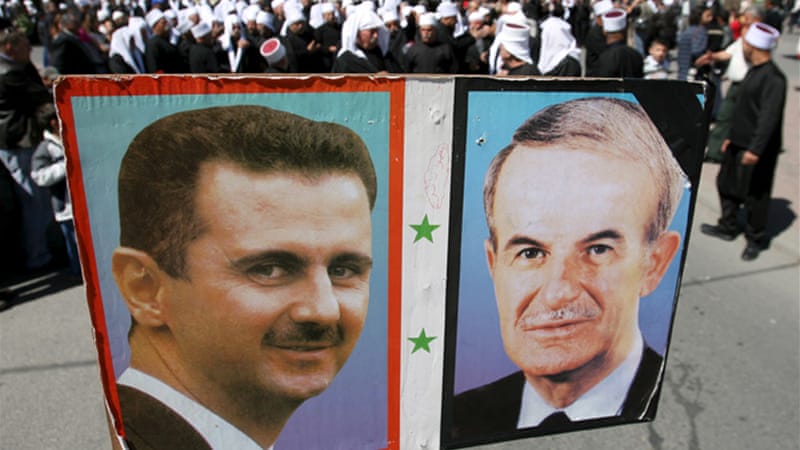Corrective Movement (Syria)
The
Corrective Movement (
Arabic: الحركة التصحيحية), also referred to as the
Corrective Revolution, was a political movement in
Syria, initiated by a
coup d'état, led by General
Hafez al-Assad on 13 November 1970.
[1] Al-Assad's program of reform, considered revolutionary in Syria, aimed to sustain and improve the "nationalist
socialist line" of the state and the
Ba'ath party.
[2] Al-Assad would rule Syria until his death in 2000, after which he was succeeded by his son Bashar al-Assad.
The father - the son, "cleaning the pipes" of opposition every couple decades of their "1st term" is their only way to rule.
Once half the country is murdered and expelled abroad, organize elections and reelect Yourself magnificent.
That's Assad.
Syrian presidential election, 2000 - Wikipedia
Exactly incapable of holding the country.
He's giving Kurds to Erdogan because for him to rule there can be no opposition.
The Kurds are not opposition but separatists. That Assad sent some fighters and hoped Erdogan will not attack them is more than the Kurds could have expected, the more so after all what happened in Raqqa and Deir Ezzor.
Baath fairytales.
Assad....Erdogan - it was all going long before the current civil war.
Kurds have every right to oppose these genocidal maniacs.
Kurds in Syria:
Osman Sabri and
Daham Miro along with some Kurdish politicians, founded the
Kurdistan Democratic Party of Syria (KDPS) in 1957.
The objectives of KDPS were promotion of Kurdish cultural rights, economic progress and democratic change. KDPS was never legally recognized by the Syrian state and remains an underground organization, especially after a crackdown in 1960 during which several of its leaders were arrested, charged with separatism and imprisoned. After the failure of Syrian political union with
Egypt in 1961, Syria was declared an
Arab Republic in the interim constitution.
Syrian Arab Republic[edit]
Jazira census[edit]
On 23 August 1962, the government conducted a special population census only for the province of
Jazira, which was predominantly Kurdish.
As a result, around 120,000 Kurds in Jazira (20% of Syrian Kurds) were stripped of their Syrian citizenship. The inhabitants who had Syrian identity cards were told to hand them over to the administration for renewal. However, many of those Kurds who submitted their cards received nothing in return. Many were arbitrarily categorized as
ajanib('foreigners'), while others who did not participate in the census were categorised as
maktumin ('unregistered'), an even lower status than the
ajanib; for all intents and purposes, these unregistered Kurds did not exist in the eyes of the state. They could not get jobs, become educated, own property, participate in politics, or even get married. In some cases, classifications varied even within Kurdish families: parents had citizenship but not their children, a child could be a citizen but not his or her brothers and sisters. Those Kurds who lost their citizenship were often dispossessed of their lands, which were given by the state to Arab and Assyrian settlers.
[62] A media campaign was launched against the Kurds with slogans such as
Save Arabism in Jazira! and
Fight the Kurdish Menace!.
[63]
These policies in the Jazira region coincided with the beginning of
Barzani's
uprising in
Iraqi Kurdistan and discovery of oilfields in the Kurdish inhabited areas of Syria.
In June 1963, Syria took part in the Iraqi military campaign against the Kurds by providing aircraft, armoured vehicles and a force of 6,000 soldiers. Syrian troops crossed the Iraqi border and moved into Kurdish town of Zakho in pursuit of Barzani's fighters[64]
STOP LYING THROUGH YOUR TEETH YOU BAATHI KALB




